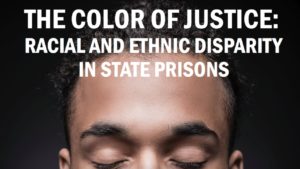
The Sentencing Project’s ‘Color of Justice’ report examines racial disparity in state prisons.
Black people are incarcerated in the nation’s state prisons five times as often as whites, a new study indicates.
The Sentencing Project’s latest report on racial and ethnic inequalities in the American prison system examined the prevailing issue on a state-by-state basis.
“Since the majority of people in prison are sentenced at the state level rather than the federal level, it is critical to understand the variation in racial and ethnic composition across states,” Ashley Nellis, author and senior research analyst wrote in the report, “and the policies and the day-to-day practices that contribute to this variance.”
The criminal justice advocates used federal data to compare rates of imprisonment for Black, white and Hispanic populations. And the findings show that African-Americans continue to face seemingly insurmountable odds in the fight for blind justice in this country.
The High(low)lights:
- Overall, Blacks are locked up in state prisons at a rate of of 1,408 per 100,000 people; Hispanics, 378 per 100,000; and whites, 275 per 100,000.
- African-Americans in Iowa, Minnesota, New Jersey, Vermont and Wisconsin are imprisoned at a rate more than 10 times that of whites.
- In 12 states, African-Americans make up more than half of the prisoners: Alabama, Delaware, Georgia, Illinois, Louisiana, Maryland, Michigan, Mississippi, New Jersey, North Carolina, South Carolina and Virginia.
- 72 percent of Maryland’s prison population is Black — the highest proportion in the U.S.
- 11 states report at least 1 in 20 adult Black males in prison.
Oklahoma, which has the country’s highest population of Black prisoners, holds 1 in 15 Black males aged 18 and older in prison.
The problem of Black mass incarceration is present in every state in the union. In Hawaii, the state with the lowest racial disparity, Blacks still serve time at a rate two times that of whites. It is a systemic matter states can not continue to ignore.
According to the report, at least three factors come up over and over again in the multiple studies done on the subject: “policies and practices that drive disparity; the role of implicit bias and stereotypes in decision making; and, structural disadvantages in communities of color which are associated with high rates of offending and arrest.”
Nellis suggests states look to New Jersey’s reforms, which included the revisions to drug laws that have contributed to the mass incarceration of African-Americans since the 1990s, specifically drug-free school zone laws.
The Sentencing Project study concludes with five recommendations for state policymakers:
- Scale back on prison sentences for low-level drug offenders, and put more resources into drug prevention and rehabilitative programs.
- Re-evaluate and amend statutory mandates on minimum sentences that prevent judges from considering cases on an individualized basis.
- Reduce the use of “Three Strikes”-inspired penalties that result in excessively long sentences for repeat offenders.
- Train criminal justice officials at every level on the dangers of implicit bias, or the stereotypes and attitudes that affect our judgments and behavior on a subconscious level.
- Introduce Racial Impact legislation, which encourages lawmakers to consider how proposed laws might disproportionately affect minority communities.


